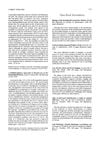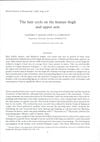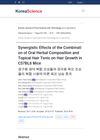 7 citations,
September 2013 in “Current Dermatology Reports”
7 citations,
September 2013 in “Current Dermatology Reports” Some skin medications are safe for pregnant women, but others pose risks or should not be used.
 30 citations,
February 2018 in “Journal of Pharmacy and Pharmacology”
30 citations,
February 2018 in “Journal of Pharmacy and Pharmacology” Hedychium spicatum has medicinal properties but needs more research for scientific validation and use.
 63 citations,
March 1995 in “International Journal of Dermatology”
63 citations,
March 1995 in “International Journal of Dermatology” Some drugs can cause hair loss, and stopping these drugs often leads to hair regrowth.
 83 citations,
May 1999 in “International Journal of Dermatology”
83 citations,
May 1999 in “International Journal of Dermatology” Hair loss that spreads out can often fix itself or be treated by finding and handling the cause.
 18 citations,
March 1990 in “Archives of Dermatology”
18 citations,
March 1990 in “Archives of Dermatology” Cyclosporine cleared a woman's resistant skin condition quickly and kept it away for over a year.
 37 citations,
January 1997 in “Clinics in Dermatology”
37 citations,
January 1997 in “Clinics in Dermatology” Hair problems are common and distressing for women, but increasing knowledge of treatments offers hope.
 January 2019 in “Springer eBooks”
January 2019 in “Springer eBooks” Some chemicals and drugs can cause hair loss, which usually grows back after stopping the treatment.
 130 citations,
August 2020 in “Drug Design Development and Therapy”
130 citations,
August 2020 in “Drug Design Development and Therapy” Nanoparticles can improve skin drug delivery but have challenges like toxicity and stability that need more research.
 34 citations,
March 2001 in “Cleveland Clinic Journal of Medicine”
34 citations,
March 2001 in “Cleveland Clinic Journal of Medicine” Manage hair shedding by identifying triggers, possibly using supplements or medications, and tracking with a health calendar.
 November 2015 in “Springer eBooks”
November 2015 in “Springer eBooks” Hair loss treated with minoxidil, finasteride, laser/light, hair transplant, and scalp prostheses; more research needed for skin of color.
1 citations,
March 2021 in “CRC Press eBooks” Oral minoxidil may be a better treatment for hair loss than topical minoxidil.
 6 citations,
October 1993 in “The journal of the Royal Society of Health”
6 citations,
October 1993 in “The journal of the Royal Society of Health” Children's hair loss has many causes and requires careful diagnosis and personalized treatment, including emotional support.
 53 citations,
October 1993 in “Drug Safety”
53 citations,
October 1993 in “Drug Safety” Oral retinoids can cause side effects ranging from mild to severe, including birth defects, and require careful monitoring and contraception.
 117 citations,
March 2013 in “Journal of the European Academy of Dermatology and Venereology”
117 citations,
March 2013 in “Journal of the European Academy of Dermatology and Venereology” No effective treatment for frontal fibrosing alopecia was found, but oral 5-alpha-reductase inhibitors had the best response; for lichen planopilaris, topical corticosteroids were commonly used but had a high relapse rate.
 1 citations,
May 1999 in “Journal of Oral and Maxillofacial Surgery”
1 citations,
May 1999 in “Journal of Oral and Maxillofacial Surgery” Patients with mandible reconstruction had better quality of life and function than those with soft-tissue reconstruction.
 3 citations,
January 2016 in “Skin appendage disorders”
3 citations,
January 2016 in “Skin appendage disorders” Possible causes of female hair loss include androgenetic alopecia, telogen effluvium, cicatricial alopecia, and alopecia areata incognita; diagnosis and treatment require dermoscopy and histopathology.
 67 citations,
July 1985 in “British journal of dermatology/British journal of dermatology, Supplement”
67 citations,
July 1985 in “British journal of dermatology/British journal of dermatology, Supplement” Men's thigh hair grows longer and has a longer growth cycle than women's, but arm hair growth is similar between genders.
22 citations,
December 1992 in “The journal of pediatrics/The Journal of pediatrics” Zinc supplements improved hair and skin conditions in two patients.
 5 citations,
March 2014 in “Journal of The American Academy of Dermatology”
5 citations,
March 2014 in “Journal of The American Academy of Dermatology” The study suggests hormonal factors may play a role in Frontal Fibrosing Alopecia and that treatments like oral antiandrogens and steroids could be beneficial.
 41 citations,
September 2007 in “Pediatric emergency care”
41 citations,
September 2007 in “Pediatric emergency care” Oral medication is necessary to treat scalp fungus in children, with griseofulvin being the usual choice.
 5 citations,
January 1987 in “Gynecologic and obstetric investigation”
5 citations,
January 1987 in “Gynecologic and obstetric investigation” Cyproterone acetate implants were more effective at reducing facial hair and improving skin in severe hirsutism than oral treatment.
24 citations,
March 2009 in “Archives of dermatological research” The combination of oral PUVA and corticosteroids helps regrow hair in severe alopecia areata.
 July 2007 in “DOAJ (DOAJ: Directory of Open Access Journals)”
July 2007 in “DOAJ (DOAJ: Directory of Open Access Journals)” Female pattern hair loss, common in women, can be treated with oral antiandrogens and topical minoxidil, but these are more effective at preventing further loss than regrowing hair. Other helpful methods include counseling, cosmetic camouflage, and hair transplantation. Treatment must continue for effects to last and it may take up to 2 years to see results.
 1 citations,
April 2012 in “Korean Journal of Food Science and Technology”
1 citations,
April 2012 in “Korean Journal of Food Science and Technology” Using both oral herbal supplements and hair tonic together works better for hair growth than using just the tonic.
 4 citations,
August 2013 in “Expert Review of Dermatology”
4 citations,
August 2013 in “Expert Review of Dermatology” Updated treatments for female hair loss include minoxidil, antiandrogens, hair transplants, and light therapy.

Combining oral and topical treatments improves hair growth more than using either alone.

Different hair and nail conditions can indicate health issues and have specific treatments; accurate diagnosis is crucial before treatment.
 2 citations,
August 2002 in “Zeitschrift für Hautkrankheiten”
2 citations,
August 2002 in “Zeitschrift für Hautkrankheiten” Telogen effluvium is a hair loss condition caused by various factors and requires a thorough examination to diagnose and differentiate from other hair loss types.
63 citations,
November 2012 in “Journal of Cellular Biochemistry” Runx1 affects hair growth, cancer development, and autoimmune diseases in epithelial tissues.
 September 2024 in “South Eastern European Journal of Public Health”
September 2024 in “South Eastern European Journal of Public Health” Treatment improved PCOS symptoms and reduced BMI and certain immune factors.


























